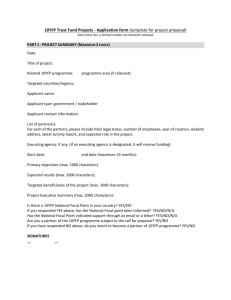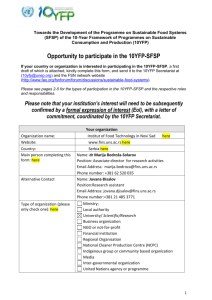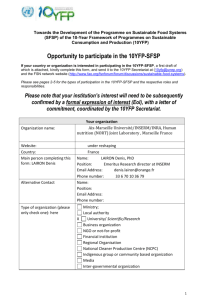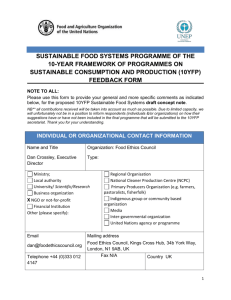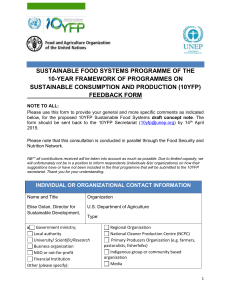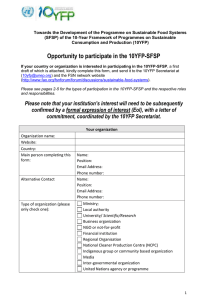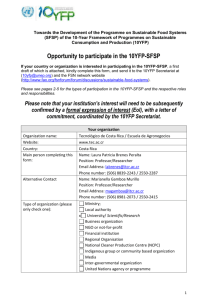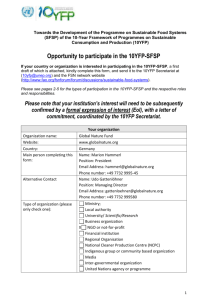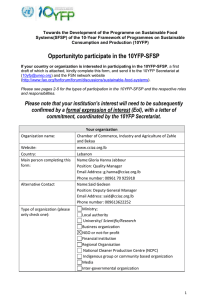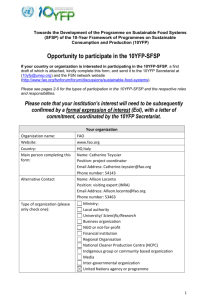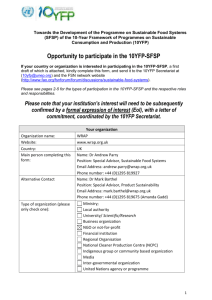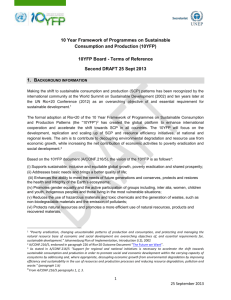Growing New Farmers - Food and Agriculture Organization of the
advertisement
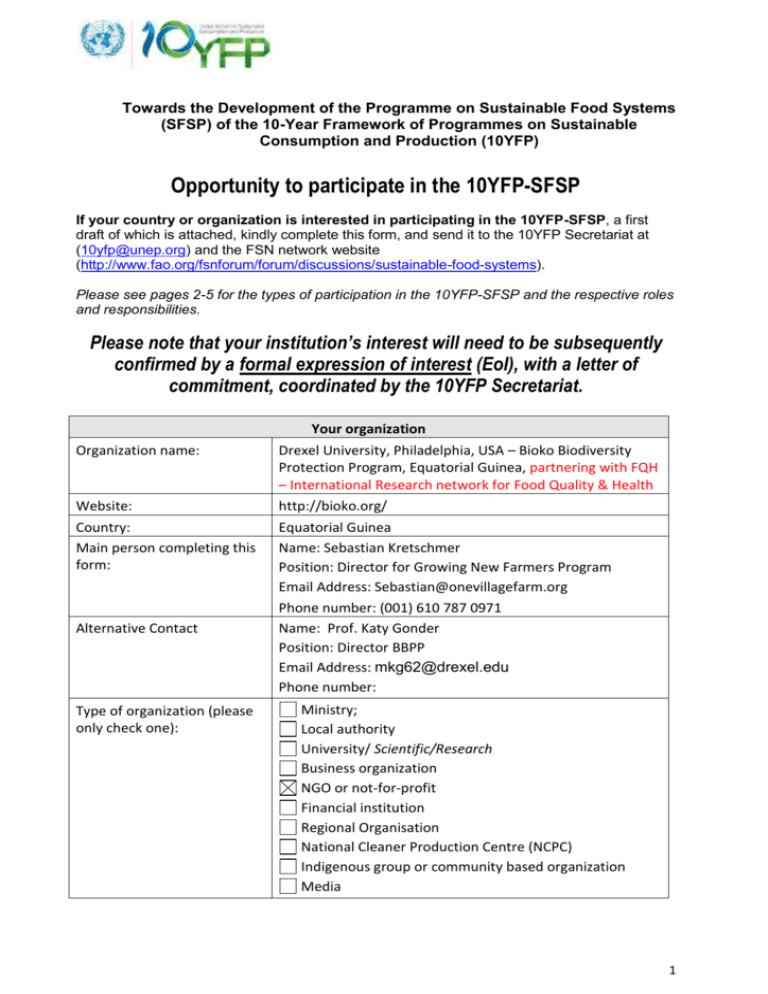
Towards the Development of the Programme on Sustainable Food Systems (SFSP) of the 10-Year Framework of Programmes on Sustainable Consumption and Production (10YFP) Opportunity to participate in the 10YFP-SFSP If your country or organization is interested in participating in the 10YFP-SFSP, a first draft of which is attached, kindly complete this form, and send it to the 10YFP Secretariat at (10yfp@unep.org) and the FSN network website (http://www.fao.org/fsnforum/forum/discussions/sustainable-food-systems). Please see pages 2-5 for the types of participation in the 10YFP-SFSP and the respective roles and responsibilities. Please note that your institution’s interest will need to be subsequently confirmed by a formal expression of interest (EoI), with a letter of commitment, coordinated by the 10YFP Secretariat. Your organization Organization name: Drexel University, Philadelphia, USA – Bioko Biodiversity Protection Program, Equatorial Guinea, partnering with FQH – International Research network for Food Quality & Health Website: http://bioko.org/ Country: Main person completing this form: Equatorial Guinea Name: Sebastian Kretschmer Position: Director for Growing New Farmers Program Email Address: Sebastian@onevillagefarm.org Phone number: (001) 610 787 0971 Name: Prof. Katy Gonder Position: Director BBPP Email Address: mkg62@drexel.edu Phone number: Alternative Contact Type of organization (please only check one): Ministry; Local authority University/ Scientific/Research Business organization NGO or not-for-profit Financial institution Regional Organisation National Cleaner Production Centre (NCPC) Indigenous group or community based organization Media 1 Brief description of your organization (please include objective and main areas of interest) Inter-governmental organization United Nations agency or programme Other (please specify): The BBPP has been founded almost 20 years ago and it has been researching biodiversity on Bioko Island. This year a farming program has been added “Growing New Farmers” with the aim to build a sustainable food system in EG. Please specify your proposed participation in the 10YFP-SFSP Type of proposed Lead actor participation Co-Lead actor Member of Multi-stakeholder Advisory Committee (MAC) X Coordinator of a programme work area Partner What is your main motivation to be part of the 10YFP-SFSP? Please explain in a few paragraphs The organic food system, which emerged 100 years ago, has a definition, principles, standards and metrics. By now it has data from more than 160 countries, and regulations in force in more than 80 countries or regions. FQH and its partners have thus began to develop an organic food system programme (OFSP) to be proposed as a Work Area for the new 10 Year Framework Programme on Sustainable Food Systems, under development. The “Growing New Farmers” will implement a sustainable food system in Equatorial Guinea by disseminating organic agriculture techniques and establishing ethical supply chains. At the same time it will promote the Organic Diet Concept by FQH (the German research network that we are partnering with). Equatorial Guinea has no food system to speak of – it produces only 15% of all the food consumed domestically and the agricultural practices are irresponsible due to the excessive use of ag-chemicals, while basic soil health parameters are disregarded. Ecological agriculture has the potential to increase crop yields dramatically while protecting biodiversity, promoting regional economic development and spurring a national conversation about food sovereignty and a dignified national organic diet. Our “growing new farmers” program can be seen as the implementation arm of the German FQH Organic Diet initiative. How could your country or organization contribute to the development and implementation of the 10YFP-SFSP? Together with our partners we will explore the experiences, insights and 2 knowledge accrued within the organic food system for transferable, practicable findings supporting the overall transformation to sustainable diets and sustainable food systems. For example, within the OFSP one project will focus on the notion/concept of a diversity of possible ‘organic diets’: Studies show that regular consumers of organic products have healthier life-style profiles and a better compliance with the sustainable diet concept. As global diets link sustainability and health, organic may be defined as a global, healthy and sustainable diet, taking into account regional and cultural adaptations. The project is placed within the Organic Food System Program (our proposed work area for the new 10 Year Framework Programme on Sustainable Food Systems). Our organization and its partners will actively contribute to this initiative. The “Growing New Farmers” program is collaborating with UNGE (the national university of EG) – we are developing a syllabus for a course for this September called “organic agriculture and sustainable food systems”. One of the objectives of the program is to build capacity both institutionally but throughout the food system and establish an institute that will house the biodiversity and farm incubation and food system work in perpetuity in EG. The institute will be called “SIEMBRA” Instituto para la Sostenibilidad Ecologica y el Manejo de la Biodiversidad por la Agricultura Regenerativa. Please provide a brief description of your efforts in the field of sustainable food systems. One aim of our proposed activity is to develop an actionable diet concept that can be regionally and culturally adapted, based on learnings from the organic food system. The thus developed organic diets may be taken as pilot models for sustainable diets within sustainable food systems. The GNF program under the umbrella of the BBPP (Bioko Biodiversity Protection Program) has clear targets that have to do with tangible improvements of the entire agriculture sector throughout EG. EG is undergoing currently what is known the “Dutch Syndrome” because of the negligence of its primary sector while focussing too hard on its oil riches. Growing New Farmers wants to help to diversify the economy and increase production from the current 15% to 75% within 5 years by building cooperative marketing structures, supply chains, organic certification, an infrastructure for biological farming inputs, food distribution, cooling and processing networks, etc. As the representative of my organization/government, I confirm that the information is correct and true. Date 29.04.2015 Name Sebastian Kretschmer 3 Before expressing any interest, please, kindly read carefully the “Guidance document on the 10YFP PROGRAMMES : Criteria, structure and steps to develop and operationalize them”1, which explains the objective and activities of the programme, the different roles available and benefits and responsibilities associated with them. Immediately below you will find a summary of the role and responsibilities of the Lead and Co-leads, Multi-stakeholder Advisory Committee (MAC) members, and Partners of the programme. These will be set out in more detail in the formal Expression of Interest form that you will receive subsequently from the 10YFP Secretariat. ____________________________________________________________________ Role and Responsibilities of the Lead and Co-leads of a 10YFP Programme: Support the overall coordination of the programme implementation and proactively fundraise for the programme; Provide financial and/or in-kind contribution, including dedicated staff in support of a “Coordination Desk” (each programme will need a minimum of 1-2 full time staff to start operating); Jointly supervise the work of the Coordination Desk (whose tasks could be executed from different geographical locations); Chair and co-chair the MAC meetings, facilitate the decision-making within the Committee and support its activities, including those related to securing support from the 10YFP Trust Fund; Act as liaison and focal point for contacts between the Secretariat and the SFS programme and all its partners; Report on progress and outcomes as required, including through the preparation of an annual report for the 10YFP Secretariat to convey to the Board and to be included in the 10YFP report to ECOSOC. Criteria for lead and co-leads: Any government from any UN member state relevant regional or national organizations, international organizations (including UN agencies), industry or business organizations, non-governmental/civil society organizations or academic institutions, or any other entity that supports the goals of the 10YFP (www.unep.org/10yfp) and agrees to work towards them can apply to become a lead or a co-lead of a specific 10YFP programme. The lead and co-lead(s) should: • demonstrate an active or leading role in supporting the shift towards sustainable consumption and production patterns at national and/or regional levels; • provide resources (including in-kind contributions or expertise) for coordination 1 Document available at: www.unep.org/10yfp and http://www.unep.org/10yfp/Portals/50150/Guidance_Doc_10YFP_Programme%20development_1_V1_March14.pdf 4 and implementation of activities under this programme; and • ensure minimum commitment to remain engaged for at least four years. Role and Responsibilities of the MAC of a 10YFP Programme: review goals, objectives and measures of success, based on the initial programme’s work plan, with the aim of providing guidance on progress towards more sustainable consumption and production patterns; review on the performance and evolution of the programme’s work plan, advise on and proactively engage new partners, initiatives and activities in the line with the objectives of the programme, as well as in response to emerging demand and priorities; enhance synergies and cooperation among stakeholders within the programme as well as with other programmes of the 10YFP; propose projects and/or activities for implementation in accordance with the work plan of the programme; provide guidance to the 10YFP Secretariat for the elaboration of calls for proposals for the 10YFP Trust Fund, in the area of the programme, and to screen and short list proposals received based on established criteria; Criteria for the members of the Multi-stakeholder Advisory Committee Any government from any UN member state relevant regional or international organizations, industry or business organizations, non-governmental/civil society organizations or academic institutions, or any other entity that supports the goals of the 10YFP and agrees to work towards them can apply to become a member of the MAC of a specific programme. The composition of the MAC ideally could reflect a diversity of partner categories and geographic regions, in this context, members of the MAC should: demonstrate strong interest and/or recognized expertise and experience, if possible reflected in policies and actions, in the area of the programme; have played an active or leading role in supporting the sustainable consumption and production and/or sustainable development agenda at the national and/or regional levels. Role of Coordinators of the Programme Work Areas Coordinators of a programme work area are not necessarily members of the MultiStakeholder Advisory Committee, but can take an active role in coordinating one or more of the programme work areas. When coordinating a work area of the programme, they are responsible for ensuring that the related activities are delivered in an inclusive and effective manner. They bring their expertise, expand their networks and partnerships, build synergies and help scale-up and replicate best practices on SCP at all levels. 5 ____________________________________________________________________ Role of Partners Any stakeholder supporting implementation and/or benefiting from the activities of the programme could be a partner of a programme. Those activities include workshops, trainings, making use and supporting dissemination of the materials, including policy and capacity-building tools and reports produced by the programme. Partners do not necessarily need to provide technical and/or financial support. Thank you very much for your time., 6
